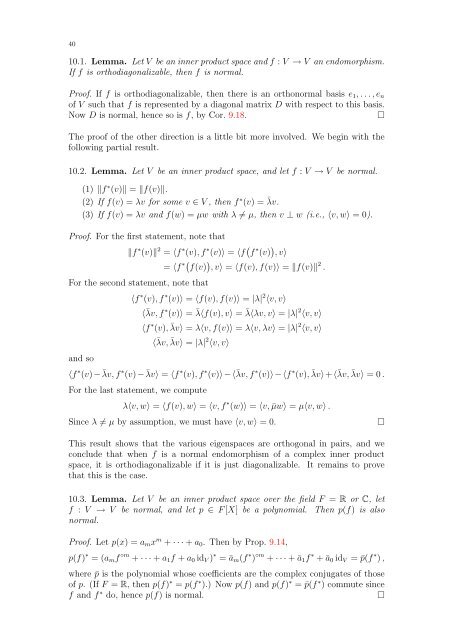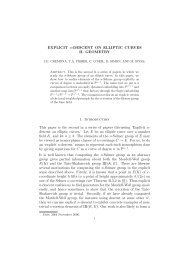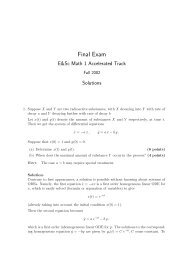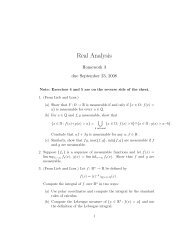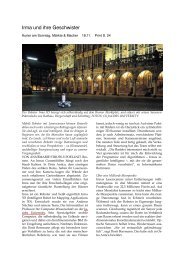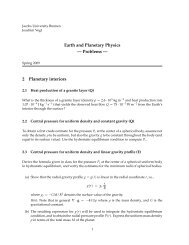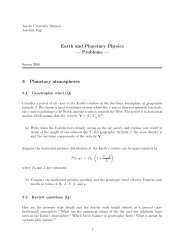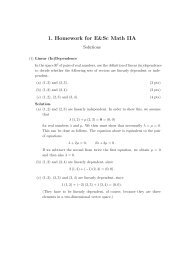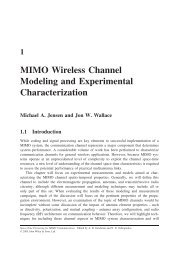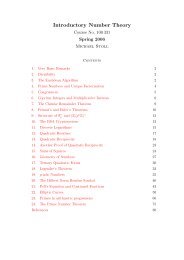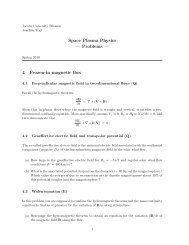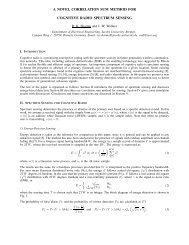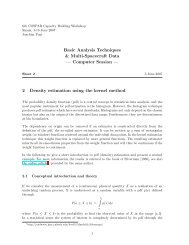Linear Algebra II (pdf, 500 kB)
Linear Algebra II (pdf, 500 kB)
Linear Algebra II (pdf, 500 kB)
You also want an ePaper? Increase the reach of your titles
YUMPU automatically turns print PDFs into web optimized ePapers that Google loves.
40<br />
10.1. Lemma. Let V be an inner product space and f : V → V an endomorphism.<br />
If f is orthodiagonalizable, then f is normal.<br />
Proof. If f is orthodiagonalizable, then there is an orthonormal basis e1, . . . , en<br />
of V such that f is represented by a diagonal matrix D with respect to this basis.<br />
Now D is normal, hence so is f, by Cor. 9.18. <br />
The proof of the other direction is a little bit more involved. We begin with the<br />
following partial result.<br />
10.2. Lemma. Let V be an inner product space, and let f : V → V be normal.<br />
(1) f ∗ (v) = f(v).<br />
(2) If f(v) = λv for some v ∈ V , then f ∗ (v) = ¯ λv.<br />
(3) If f(v) = λv and f(w) = µw with λ = µ, then v ⊥ w (i.e., 〈v, w〉 = 0).<br />
Proof. For the first statement, note that<br />
f ∗ (v) 2 = 〈f ∗ (v), f ∗ (v)〉 = 〈f f ∗ (v) , v〉<br />
For the second statement, note that<br />
and so<br />
= 〈f ∗ f(v) , v〉 = 〈f(v), f(v)〉 = f(v) 2 .<br />
〈f ∗ (v), f ∗ (v)〉 = 〈f(v), f(v)〉 = |λ| 2 〈v, v〉<br />
〈 ¯ λv, f ∗ (v)〉 = ¯ λ〈f(v), v〉 = ¯ λ〈λv, v〉 = |λ| 2 〈v, v〉<br />
〈f ∗ (v), ¯ λv〉 = λ〈v, f(v)〉 = λ〈v, λv〉 = |λ| 2 〈v, v〉<br />
〈 ¯ λv, ¯ λv〉 = |λ| 2 〈v, v〉<br />
〈f ∗ (v)− ¯ λv, f ∗ (v)− ¯ λv〉 = 〈f ∗ (v), f ∗ (v)〉−〈 ¯ λv, f ∗ (v)〉−〈f ∗ (v), ¯ λv〉+〈 ¯ λv, ¯ λv〉 = 0 .<br />
For the last statement, we compute<br />
λ〈v, w〉 = 〈f(v), w〉 = 〈v, f ∗ (w)〉 = 〈v, ¯µw〉 = µ〈v, w〉 .<br />
Since λ = µ by assumption, we must have 〈v, w〉 = 0. <br />
This result shows that the various eigenspaces are orthogonal in pairs, and we<br />
conclude that when f is a normal endomorphism of a complex inner product<br />
space, it is orthodiagonalizable if it is just diagonalizable. It remains to prove<br />
that this is the case.<br />
10.3. Lemma. Let V be an inner product space over the field F = R or C, let<br />
f : V → V be normal, and let p ∈ F [X] be a polynomial. Then p(f) is also<br />
normal.<br />
Proof. Let p(x) = amx m + · · · + a0. Then by Prop. 9.14,<br />
p(f) ∗ = (amf ◦m + · · · + a1f + a0 idV ) ∗ = ām(f ∗ ) ◦m + · · · + ā1f ∗ + ā0 idV = ¯p(f ∗ ) ,<br />
where ¯p is the polynomial whose coefficients are the complex conjugates of those<br />
of p. (If F = R, then p(f) ∗ = p(f ∗ ).) Now p(f) and p(f) ∗ = ¯p(f ∗ ) commute since<br />
f and f ∗ do, hence p(f) is normal.


